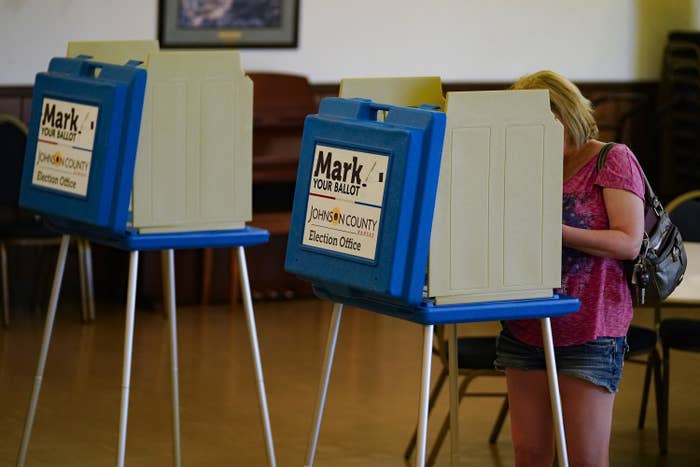
Kansas voters rejected an attempt to strip abortion protections from their state constitution on Tuesday, protecting people’s right to end a pregnancy in the Great Plains state as nationwide access continues to crumble.
According to preliminary election results, 59% voted against the Value Them Both amendment, which would have added language to the Kansas Constitution that it “does not require government funding of abortion and does not create or secure a right to abortion.” The ballot measure’s defeat means abortion will remain protected as a right under existing provisions of the state constitution, as held by the Kansas Supreme Court since 2019.
It was the first time that voters have weighed in on the issue since the Supreme Court overturned Roe v. Wade, the landmark 1973 opinion that legalized abortion nationwide. Advocates and political observers viewed the election in Kansas as a test of how fired up people are to defend abortion rights in the wake of the court’s June 24 decision.
“It looks to be one of the highest turnout primary elections in recent years, which signals that abortion is not only an issue that Kansans care deeply about but one that mobilizes voters to participate in elections, and likely in other ways as well,” Alexandra Middlewood, an assistant professor of political science at Wichita State University, told BuzzFeed News via email.
Nancy Northup, president and CEO of the Center for Reproductive Rights, called the outcome “an enormous victory” for Kansans.
“In 2019, the Supreme Court of Kansas recognized that the rights to self-determination and bodily autonomy are deeply rooted in Kansas history and values, and today the Kansas voters resoundingly agreed,” Northup said in a statement. “Like the strong majority of people across the U.S., Kansans want to make their own decisions about abortion.”
Local experts and a recent poll forecast that the vote would be close. Though a majority of Kansans generally support the right to abortion, a lack of awareness around the vote and confusion over what a “yes” or “no” vote on the amendment would do posed challenges for abortion rights supporters. The vote also came in a primary election when turnout tends to be low and unaffiliated voters typically don’t vote.
Early voting statistics showed Kansans voted ahead of Tuesday’s Election Day in higher numbers than in recent years. As of Monday morning, more than 270,000 people had voted by mail or via early in-person ballots, according to the Kansas Secretary of State’s office — three times the amount of early votes in 2018’s midterm primary over the same time period. In the 2020 primary, around 230,000 people had voted early by this stage.

As people headed to the polls, the significance of the proposed amendment weighed heavily on their minds. Singer and actor Janelle Monáe, who grew up in Kansas City, Kansas, urged people to vote “no” on the amendment in a video message on Twitter. “It’s your body, it’s your future,” Monáe said. “I love you, Kansas.”
In Wichita, voters cast their ballots inside the church where Dr. George Tiller, the director of an abortion clinic, was murdered by an anti-abortion extremist in 2009. “It really hit me when I walked in the doors, that this is the exact place where Dr. George Tiller was murdered by a crazy … anti-abortion fanatic,” voter Chris Wallace told the Wichita Beacon. “I pray that the amendment fails and that he is looking down on us and so happy.”
Even though Kansans voted to protect abortion rights, the fight over people’s reproductive freedom in the state is likely not over. Patrick Miller, a professor of political science at the University of Kansas, said Republican lawmakers could try to put the issue before voters again. In November, voters will also decide whether to retain six of the seven justices on the Kansas Supreme Court and whether to reelect Gov. Laura Kelly, a Democrat.
“If they're not retained and the next governor’s a Republican, then a newly reconstituted Supreme Court can just reverse itself,” Miller said.
In spite of the uncertainty of the future, Tuesday’s vote was a huge victory for people in Kansas and neighboring states who may need abortion care. Since the Supreme Court’s June 24 ruling, lawmakers in more than a dozen states have moved to eliminate or severely restrict access to abortion. Abortion is currently illegal in several states surrounding Kansas, including Missouri, Arkansas, and Oklahoma. If the amendment had passed, Kansas lawmakers were expected to try to enact their own abortion ban — which would have meant an even greater burden for patients in the Great Plains region getting care.
“We have seen the devastation caused by a loss of access to abortion in neighboring states and tonight, Kansans saw through the deception of anti-abortion interests to ensure people in their state retained their rights,” Emily Wales, president and CEO of Planned Parenthood Great Plains Votes, said in a statement. “Planned Parenthood Great Plains has served Kansas for decades and tomorrow, we’ll wake up and do just that – but with the reassurance that people in Kansas will continue to make medical decisions that are best for their health, their lives, and their futures.”
